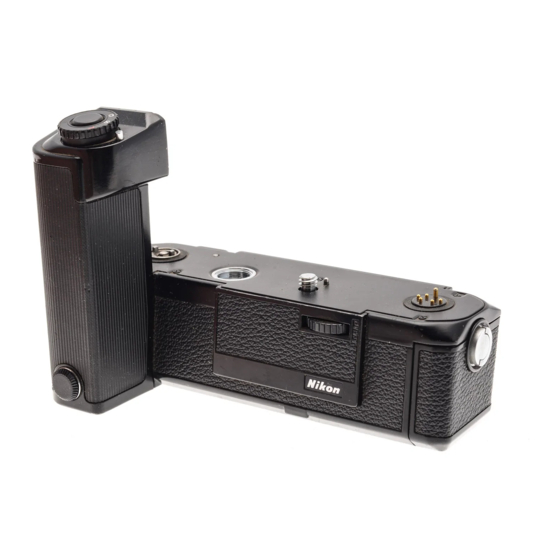Nikon MD-15 Manual de instruções - Página 12
Procurar online ou descarregar pdf Manual de instruções para Acessórios para câmaras Nikon MD-15. Nikon MD-15 18 páginas. Motor drive

TIME LAPSE
Time lapse photography, the taking of a series of photographs
over a period of time from a fixed position, is easily accom-
plished with your MD-12 equipped camera and a suitable tim-
ing device. Timing devices for time lapse photography—the
Nikon Intervalometer MT-1,for example—usually have two
variable controls: one for puIse duration and the other for inter-
val time. Pulse duration refers to the length of time that the trig-
gering pulse lasts. Interval time is the time interval between
pulses and governs the frequency of the photographs. Addition-
ally, the S-C selector on the MD-12 provides you with the op-
tion of taking single photographs or shooting in bursts.
With the S-C selector set to "S," one exposure will be made for
each triggering pulse, the motor winding on automatically at
the end of the triggering pulse or the exposure, whichever is
longer. The interval time can be set at any duration, but avoid
setting the trigger pulse longer than the interval time. Other-
wise continuous or erratic operation will occur.
With the S-C selector set to "C," if the triggering pulse's dura-
tion is longer than the shutter speed set (or 0.25 sec. in the case
of the higher shutter speeds), bursts will be fired at each inter-
val. For example, if the shutter speed is set at 1/1000 sec., and
the trigger pulse duration is 2 sec., then approximately 7 expo-
sures will be made at each interval.
Generally speaking you will find that operation with the S-C
selector set to "S" and the trigger pulse duration set between 0.1
and 0.25 sec. is advisable for the majority of time lapse situa-
tions. The variable trigger pulse duration found on some inter-
valometers is a feature necessitated by the design of the older
generation of motor drives, and is largely redundant with the
MD-12. Time lapse photography is not possible with the shutter
speed dial set to "B." Should you attempt this, the camera's mir-
ror may lock up, with the shutter remaining open, making op-
eration impossible. To restore normal operation in the event of
this happening, merely turn the shutter speed dial away from
the "B" setting.
